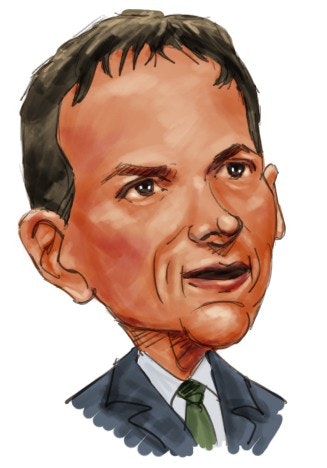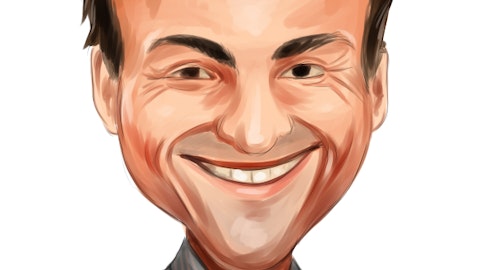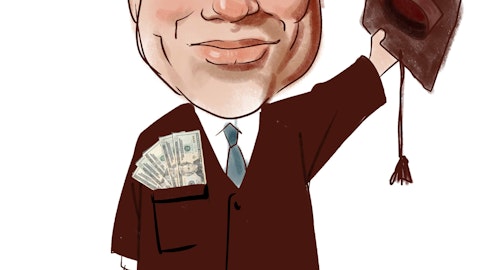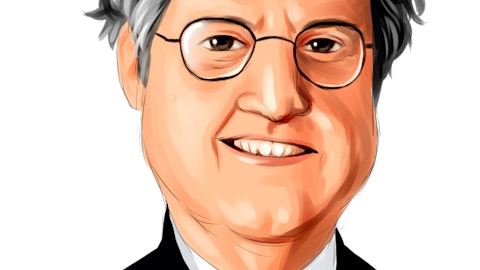Our friends at Santangel’s Review published David Einhorn’s interview with the Financial Crisis Inquiry Commission. In the interview Einhorn revealed how Greenlight usually short stocks. They usually do their due diligence before instituting a short position. However, when the market is going through a rapid change, they sell the shares first and do the due diligence later. Here is an excerpt from the interview:
David Einhorn: We short a lot of companies in a lot of different areas. It’s just part of our ongoing business. We also long a lot of companies in a lot of areas. In fact we’re always long more than we’re short and our primary business is that we we’re always sort of long-biased, if you would. So I think it’s important, because we may talk a lot about the short selling and so forth, that you recognize or anyone who’s listening recognizes that our primary business is with a long-bias towards things.

The first financial shorts that we shorted that pertained to the general topic that I understand that you’re investigating were the monoline bond insurers, most particularly MBIA and then later Ambac. With the MBIA short, really commencing I think in 2002, by which point we had realized that their business model didn’t make any sense. And later as we investigated that over a number of years, we became very concerned relating to how MBIA was relating to other participants in what later became the financial crisis, most particularly the credit rating agencies, and later eventually the investment banks. We had got a much heightened sense of the coming credit crisis in August of 2007. The most clearly precipitating event in my mind was when BNP Paribas froze the money markets of some of their customers, which struck me as reflecting the complete failure of the securitizations. And that combined with a view that a lot of AAA-rated securities had been purchased by entities and people, including foreign people and entities that simply did not want to assess the credit worthiness of what they were buying and they bought it because it was AAA. I felt that the failure of the AAA securities was going to lead to a rejection of securitization and so in August of 2007, we did sort of a quick research project to identify companies where their business was reliant upon securitization. And when we found them, and I think we found approximately two dozen over the course of the weekend, that was the basis for instituting short positions pending doing additional work.
Interviewer: And so were those, the 24 companies that were dependent on securitizations, you don’t need to list me all 24 by name, but generally what types of companies were they? Were they the I-banks and various mortgage companies and things like that?
David Einhorn: Yeah, they were investment banks. They were commercial banks. They were certain companies that were dependent on real estate. They were the rating agencies, the bond insurers, the mortgage guarantors and I might have missed a miscellaneous one or two but that’s the gist of where they were.
Interviewer: I know from looking at some of the things you’ve written before, some of your speeches, at least in terms of MBIA, I think you wrote that in addition…that over time, 1: they were becoming more leveraged and 2: they went from just insuring municipal securities to insuring structured credit. Was there other facts besides those two things that got you concerned about MBIA and I take it by extension, Ambac and the other monolines?
David Einhorn: Yeah, I came to the idea that first of all that the business itself didn’t make any sense. That the business was to take credit risk for a small fraction of what the market said the credit spread was. I mean that’s the premise of the business. The market said credit spread is 200 basis points, we will insure it for 50 basis points, the insured bond will trade 100 basis points tighter so the issuer will split the savings with us, we’ll keep 50 and they’ll keep 50 and so forth. And we didn’t understand why it would make sense to have a business that charges 50 basis points to take what the whole rest of the market says is 200 basis point of credit risk as a general proposition. And as we investigated it, we realized a couple of the things. The first was that the accounting was giving them reasonable economics because the accounting itself wasn’t describing the economics. The company put up boss provisions that were by definition a percentage of premium as opposed to a measure of the actual risk that they had taken on. So literally if you were going to charge a dollar premium and you were to put up I think 10 per cent of that as a loss reserve, call it 10 cents, I forget what the exact figure was. If you came in the next day, reduced your price and charged 50 cents to take the same risk, now you would put up a loss reserve of only 5 cents. So the less they charge, the worse the deal was for them and the lower loss provision that they provided. The second was they were front loading the revenue recognition relating to the premiums, particularly on the structured finance business. They had this convoluted way of saying that the risk was expiring on an accelerated basis, even though we believed that the accounting rules said that the risk needed to expire actually as the principal and interest payments were being made. In other words, if you had a bond that was just a single payment and it was in 10 years, after 1 year, you still were insuring the full value, none of the risk was expiring. But MBIA would have recognized 10 per cent of the profit on that. One year had passed. And we wrote various letters to the SEC and the accounting authority. What are those guys up in Connecticut called?
Interviewer: The FASB?
David Einhorn: FASB, yeah, on this topic. We met with FASB to discuss it.
Interviewer: Okay.
David Einhorn: So we thought that their accounting was bad. If you fast forward then there was the question of as it became clear that MBIA’s business was actually impaired, why was it that the rating agencies were so reluctant to take away their AAA rating? And from that we identified a major conflict with the rating agencies, which was that the rating agencies loved having monoline bond insurers rating say municipalities and structured finance for that matter because once they were insured, they could be rated AAA and the rating agency didn’t need to actually monitor the deals.
Interviewer: Well, I hear you saying that, but I mean if the rating agency sees a monoline insurer insuring a deal, presumably they’re looking at the monoline insurer.
David Einhorn: That’s right, that was the rationale. So the rationale was it was very effective for the rating agency to leave the monoline as a AAA because they didn’t have to check whether XYZ municipality in California was screwing around with their pension. Because as long as MBIA had guaranteed it, they didn’t have to worry about that bond, it was AAA.
Interviewer: Right.
David Einhorn: But the corollary to that was if they downgraded MBIA, they were going to have to review literally tens of thousands of credits.
Interviewer: Did you ever talk to the folks… I mean I think I’ve read you saying that before, that one of the reasons they had an incentive not to downgrade the monolines was because then they’d have to do more work on what the monolines were insuring. Did you ever have any discussions with the credit rating agencies about that?
David Einhorn: Yes I did. I went to Moody’s office and discussed it with them.
Interviewer: And when did you do that and what did they say?
David Einhorn: That meeting had to have been approximately late 2007 or maybe even a little bit before that. I would have to check.
Interviewer: If it helps, they did the mass downgrades of the RNBS in July of ’07 and then the CDO’s in October of ’07.
David Einhorn: Yeah, and when did they get around to actually downgrading MBIA?
Interviewer: That I don’t know off the top of my head.
David Einhorn: Right, the answer is I’m not sure but I think it was late ’07 and we could get back and give you an exact date because there’s a record of it.
Interviewer: Okay.
David Einhorn: Okay, but in any case, when I met with them, their basic attitude was – they had half a dozen people in the room including their most senior people – was that they were on a listening tour. They weren’t going to react to anything that I said. And so I would say I got no reaction, but the idea that there were… that the conflict that I identified and pointed out to them, it certainly didn’t strike them as something…you could tell from the body reaction in the room, that I wasn’t telling them anything they didn’t already know.
Interviewer: Who did you meet with?
Interviewer: Yeah, do you recall who you actually met with at Moody’s?
David Einhorn: There would be a record of that, I don’t know off the top of my head.
Interviewer: Okay. Was that your only meeting with them?
David Einhorn: Yeah, it was just one meeting.
Interviewer: Did you meet with any of the folks at either S&P or Fitch?
David Einhorn: No.
Interviewer: Okay. Did you talk to the SEC or other folks about the concerns about the rating agencies?
David Einhorn: Not in this context, no.
Interviewer: What context did you, if that’s what that meant?
David Einhorn: I’m not sure; I don’t remember any conversation with the SEC.
Interviewer: Okay. I guess I want you to continue to sort of chronologically in August of ’07, as you said you see BNP Paribas freeze redemptions and that gives concern and you’re talking to the rating agencies among other things and you’ve identified the type of companies that you had concerns about. Can you just sort of take us through chronologically through the end of ’07 and into ’08 and how things changed, if at all, for you folks?
David Einhorn: Yeah absolutely. So this is sometime in August, we put on a bunch of positions and our team here basically divided up the names for sort of further work cause we wanted to figure out which were the ones that were the most exposed. Whereas the initial couple dozen was ticked off relatively quickly over the course of a weekend, which is not our normal amount of time to due diligence, but I felt that given what was going on, there may not be a lot of time. And so we began putting on those couple dozen positions a little faster than we ordinarily would if we were just researching an individual security. So from there we began concentrating our work and trying to figure out well which were the better, more exposed companies and which were the less exposed companies and over the course of the next couple of months, we focused the list down and we covered a number of the shorts and we increased a number of the shorts as we focused on the people that we thought were most vulnerable.
Interviewer: And generally, do you recall what companies you found to be most vulnerable? Of course we all know about Lehman.
David Einhorn: Yeah, I think the ultimate list would be something close to Lehman, Bear, MBIA, Ambac, Moody’s, Wells Fargo, HSBC.
Interviewer: So the one to me anyway that sort of sounds curious out of that list is Wells. How come, do you recall why they were on the list? I didn’t know that they had a big subprime or real estate mortgage exposure.
Read the rest of the interview at Santangel’s Review.





